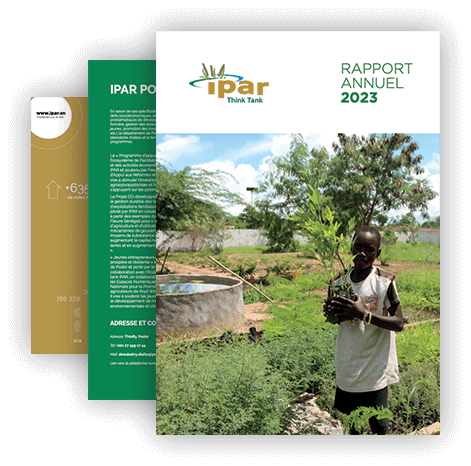IPAR is a forum for examination, dialogue and proposals for coordinated Agricultural and Rural Policies in Senegal and the West African region.
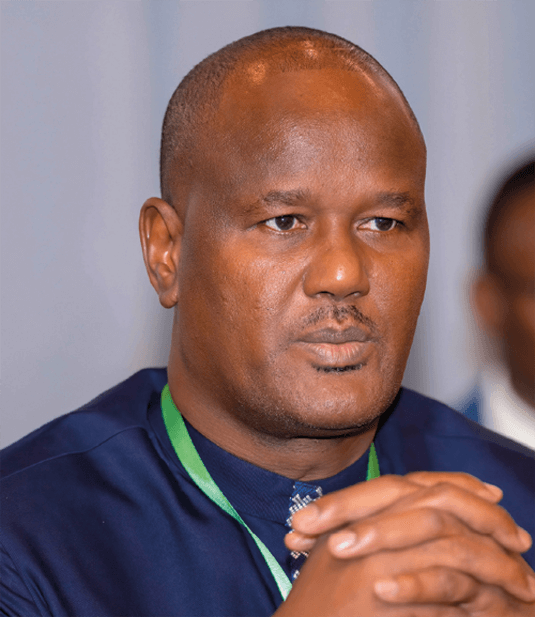
A word from the managing director
Dr Cheikh Oumar Ba
As 2023 comes to a close, I would like to extend my heartfelt appreciation to my colleagues on the Executive Board, whose exceptional work in research and policy dialogue has been invaluable. I also wish to express my gratitude to the members of the Board of Directors, whose commitment has enabled the successful execution of our planned activities.
In the African context, where rapid and complex transformations are being driven by shocks such as the repercussions of COVID-1 —to which humanity is still humanity is still trying to adapt to—we have focused on bolstering our resilience to better align with current priorities.
Drawing from the insights gained during these times of change, the Board of Directors adopted a new strategic plan aimed at transforming smallholder agri- silvopastoral and fisheries farms with a partnership-based, collaborative approach that emphasizes evidence-based data generation, strategic analysis, and both thematic and territorial foresight.
Our 2023 initiatives have reinforced our deep integration within local regions. The growing trust that local stakeholders place in IPAR’s offerings, aimed at transforming these areas into vibrant environments rather than isolated entities, was exemplified by the renewal of our partnership with the Department of Podor, following the economic forum, supported by the Feed the Future Senegal Policy Systems Services (PSS) and carried out by the DAI-IPAR consortium, with funding from USAID.
The Fanaye forum (Department of Podor) an extension of the Podor forum, has provided valuable training to large groups of young people and women entrepreneurs about the pressing challenges of unemployment, rural exodus, and irregular migration.
At national and international level, IPAR initiated a range of discussions at both the national and international levels, including webinars, scientific events, conferences, and exchange meetings. These platforms fostered multi- stakeholder dialogue on key issues such as land tenure (National Land Tenure Forum in Senegal), agroecological transition (JAES 2023), and the management of water resources in transboundary basins. These efforts were particularly evident through partnerships with the RIM- Rural platform in Mauritania, supported by the Belgian Development Agency (Enabel) with funding from the European Union, as well as through the Hydro-diplomacy virtual platform, etc.
In terms of research, IPAR continued to provide evidence- based data to inform policy-making. This included strengthening partnerships in the sanitation sector with research institutions from the WAEMU think tank network, through the creation and leadership of a working group.
In Senegal, IPAR was asked by the Ministry for Women, the Family and the Protection of Children to design and conduct national consultations as part of the National Conference on Women’s Entrepreneurship and Empowerment of Women, chaired by the President of the Republic of Senegal and drew nearly 10,000 participants.
It was an opportunity to formalize the meetings and take important decisions in favor of women entrepreneurs.
The 2023 Activity Report, which follows, will offer further details on the past year’s initiatives, highlighting the valuable lessons learned and key areas to focus on as we strive to maintain IPAR’s standing as an independent benchmark institution for the analysis and debate on national and regional public policies.
In closing, I would like to extend my sincere thanks to all our technical and financial partners whose support has made these initiatives possible, with a special note of gratitude to the Hewlett Foundation for their continued trust and unwavering support.
ENJOY YOUR READING!
To be a benchmark think tank in Africa, catalyzing economic and social transformations that will lead to sustainable, inclusive and equitable development, in which family farms will play a key role.
To contribute to the economic and social development of Senegal and the West African region by creating forums for exchange and debate based on the findings of rigorous strategic and forward-looking research, closely linked to the current and future challenges facing West African agricultural economies and smallholder farms in particular.
- Commitment
- Objectivity
- Responsibility
- Equity
We
operate
in 11 countries,
primarily
in West
Africa.
1
Mauritania
RIMRural PCR-SAT, PRODEFI
2
Mali
CoMPRA WASPA
3
Niger
WASPA
4
Senegal
(Dakar, zone des Niayes, Podor, Bignona, Loul Sessene, Ndiop, Kaolack, Fatick, Mbour, Tamba, …)
21 Projets à l’échelle nationale et dans les territoires
5
Guinea
WEL
6
Sierra Leone
Projet de recherche-action sur la migration et l’intégration régionale
7
Côte d’Ivoire
DUA, WASPA
8
Burkina Faso
DUA, WASPA
9
Benin
DUA, EFI-PME, WASPA
10
Nigeria
GRAIN, CoMPRA
11
Ouganda
GRAIN
IPAR MAURITANIA
Created in 2018 by RIMRAP, the Rim Rural platform, run by IPAR office in Mauritania, is a framework for consultation and multi-stakeholder dialogue on the issues and challenges related to the agro-pastoralism sector in Mauritania.
It is made up of all rural development stakeholders (government departments, technical and financial partners, civil society organizations, the private sector, universities, research institutes, etc.) with a view to facilitating exchanges and perpetuating an inclusive sectoral dialogue on common issues.
OBJECTIVE AND MISSION
The platform aims to facilitate consultation and dialogue, fostering solutions derived from collective intelligence.
Its mission is to contribute to the guidance of political decision-makers, TFPs, CSOs and any other key actors in rural development in Mauritania.
TOPIC GROUPS
Territorial Management of Natural Resources
Infrastructure Rurale Productive
Pastoral Farming Council
Local Dairy Production
Pastoral Hydraulics
Security and Development
DIGITAL SUPPORT
The rim-rural.org website is a digital platform accessible to all actors in the rural development sector. It provides stakeholders—including policymakers, private sector and civil society representatives, as well as technical and financial partners—with relevant, useful, and up-to-date information on the rural sector, with a focus on agro-pastoralism. The platform is supported by data collection from partners and ongoing monitoring.
Click on the link
to view the digital material.
DIGITAL
RESOURCE
CENTER
11
documents
REPORTED
NEWS
724
articles
Visits
1 418 096
visitors
Address and contact
Ilot Bloc 2 Ecole Police, Tevragh Zeina -Nouakchott-Mauritanie
Tél: : 0222 45 25 25 03 – Mail : mauritanie@ipar.sn

IPAR SENEGAL (PODOR)
Due to its specific socio-economic features—such as its economic potential and socio-economic challenges—along with prevalence of critical development issues in the department like land governance, natural resource management, youth employment and employability, investment promotion and nutrition and food security, etc.), the Department of Podor has become a fertile ground for IPAR think tank activities and the preferred hub for many projects and programs.
The “Program Support Governments, the Private Sector and Civil Society in Ecosystems Management” (EFI Podor), facilitated by IPAR and supported by the Feed Future Senegal Policy System Services Project (PSS), seeks to stimulate investment in Podor’s agroforestry and fisheries sectors by leveraging the region’s potential.
The Joint Development Innovations for Sustainable Land Management in Smallholder Farms in West Africa (COINS), led by IPAR in collaboration with UJAK, was designed using case studies from Ghana and Senegal (Senegal River Valley), to “promote and enable sustainable agricultural and land use practices alongside governance mechanisms to improve livelihoods and food security while increasing natural capital through the reversal of land degradation and improved resource use efficiency.”
“Young Green Entrepreneurs for a Prosperous and Resilient Senegalese Community” is a Project being implemented in the Department of Podor by the International Secretariat for Water (ISW) in collaboration with the Ecole des Entrepreneures Québécois (EEQ) and the IPAR think tank. At local level, it is working with the Departmental Council, the Espaces Numériques Ouverts (ENO-UVS) in Podor and Ndioum, the National Agency for the Promotion of Youth Employment (ANPEJ), the Union des Jeunes Agriculteurs de Koyli Wirndé and the Podor Vocational Training Center (CFP).
The project aims to support young entrepreneurs, the majority of whom are women, in developing best practices that effectively contribute to the environmental and climate transition of communities.
Link to the digital platform dedicated to
development initiatives in Podor:
Address and contact
Adress: Thioffy, Podor
Tel: +221 77 459 17 44
Mail: aboubakry.diallo@ipar.sn

IPAR Mauritanie

Créée en 2018 par le RIMRAP, la plateforme Rim Rural, animée par le bureau de l’IPAR en Mauritanie, est un cadre de concertation et de dialogue multi-acteurs sur les enjeux et défis liés au secteur de l’agropastoralisme en Mauritanie.
Elle est composée de tous les acteurs du développement rural (Services étatiques, partenaires techniques et financiers. Organisations de la société civile, privé, universités, instituts de recherche, etc.) en vue de faciliter les échanges et de pérenniser un dialogue sectoriel inclusif autour des enjeux communs.
OBJECTIFS ET MISSIONS
L’objectif de la plateforme est de faciliter la concertation et le dialogue pour aboutir à des évidences nées d’une intelligence collective.
Sa mission consiste en une contribution aux orientations des décideurs politiques, des PTFs, des OSCs et de tout autre acteur décisif pour le développement rural en Mauritanie.
LES GROUPES THEMATIQUES
Gestion Territoriale des Ressources Naturelles
Infrastructure Rurale Productive
Conseil Agricole PastoralConseil Agricole Pastoral
Lait local
Hydraulique Pastorale
Sécurité et Développement
SUPPORT NUMERIQUE
Le site portail rim-ruralorg est un outil numérique de la plateforme mis à la disposition de tous les acteurs du secteur du développement rural Il permet l’accès à toutes les parties prenantes (décideurs politiques, représentants du secteur privé et de la société civile, partenaires techniques et financiers) à une information pertinente, utile et actualisée, sur le secteur rural, notamment l’agro-pastoralisme.
Il s’appuie sur la collecte des données transmises par les partenaires et une veille.
Cliquez sur le lien pour
consulter le support
numérique
Centre des ressources
numériques
11
documents
Activités
relayés
724
articles
Visites
1 418 096
visiteurs
Adrese et contact
Ilot Bloc 2 Ecole Police, Tevragh Zeina – Nouakchott-Mauritanie
Tél:: 0222 45 25 25 03 – Mail: mauritanie@ipar.sn

IPAR Sénégal
PODOR

En raison de ses spécificités socioéconomiques (potentiel économique, défis socioéconomiques, etc) et de la prégnance de certaines problématiques de développement dans le département (gouvernance foncière, gestion des ressources naturelles, emploi et employabilité des jeunes, promotion des investissements, nutrition et sécurité alimentaire, etc.), le département de Podor constitue pour IPAR think tank un laboratoire d’idées et le terrain de prédilection de nombreux projets et programmes.
Le << Programme d’appui à la mise en place d’un Ecosystème de Facilitation des Investissements privés et des activités économiques >> (EFI Podor), facilité par IPAR et soutenu par Feed the Future Sénégal Projet d’Appui aux Réformes et Politiques Agricoles (PSS), vise à stimuler l’investissement dans les secteurs agrosylvopastorales et halieutiques de Podor en s’appuyant sur les potentialités du territoire.
Le Projet CO-développement d’INnovations pour la gestion durable des terres dans les Systèmes d’exploitations familiales d’Afrique de l’Ouest (COINS), piloté par IPAR en collaboration avec UJAK, a été conçu, à partir des exemples du Ghana et du Sénégal (Vallée du Fleuve Sénégal) pour << inciter et permettre des pratiques d’agriculture et d’utilisation des terres durables et des mécanismes de gouvernance associés pour améliorer les moyens de subsistance et la sécurité alimentaire tout en augmentant le capital naturel en inversant la dégradation des terres et en augmentant l’efficacité de l’utilisation des ressources >>.
<< Jeunes entrepreneurs.es verts pour une communauté sénégalaise prospère et résiliente » est un projet mis en œuvre dans le département de Podor et porté par le Secrétariat International de l’Eau (SIE) en collaboration avec l’Ecole des Entrepreneures Québécois (EEQ) et le think tank IPAR, en collaboration, au niveau local, avec le Conseil départemental, les Espaces Numériques Ouverts (ENO-UVS) de Podor et Ndioum, [Agence Nationale pour la Promotion de l’Emploi des Jeunes (ANPEJ), [‘Union des jeunes agriculteurs de Koyli Wirnde et le Centre de formation professionnel de Podor (CFP). Il vise à soutenir les jeunes entrepreneurs.es, dont une majorité de femmes, dans le développement de meilleures pratiques contribuant efficacement à la transition environnementale et climatique des communautés.
Lien vers la plateforme numérique dédiée aux
initiatives de développement de Podor
Adrese et contact
Thioffy, Podor – Tel: +221 77 469 17 44 – aboubakry.diallo@ipar.sn

Assessment of
Achievements
Research activities
and knowledge
building
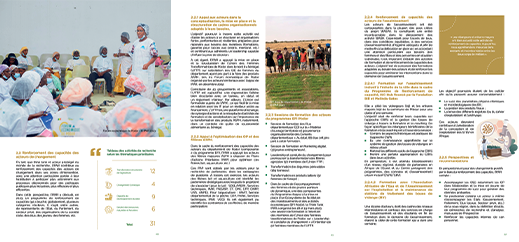
Research activities by
priority topic

Structural Transformation of Agriculture
42

Migration and Youth Employment
1

Climate Change
11

Sustainable Development
Goals
16

Natural and Land
Resource Management
22
Total
92
Assessment of
Achievements
Capacity Building
for Change Agents
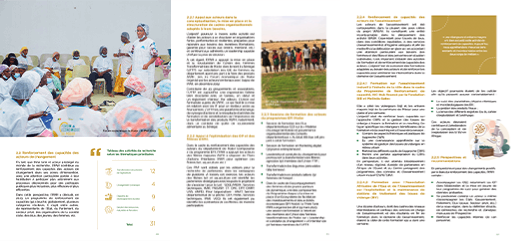
Capacity-building activities by priority topic

Structural Transformation of Agriculture
12

Climate Change
4

Sustainable Development
Goals
9

Natural and Land
Resource Management
6
Total
31
Assessment of
Achievements
Political Dialogue
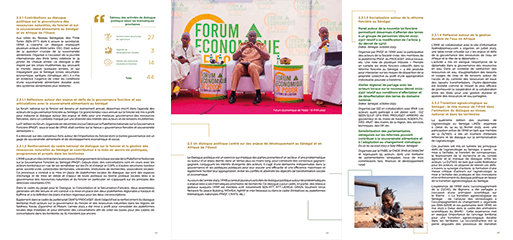
Capacity-building activities by priority topic

Structural Transformation of Agriculture
27

Sustainable Development
Goals
3

Natural and Land
Resource Management
14
Total
44
Assessment of
Achievements
Institutional and
Internal
Communications
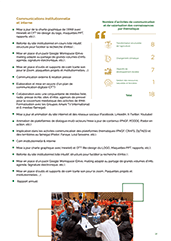
Number of communication and knowledge dissemination initiatives by topic:

Structural Transformation of Agriculture
8

Climate Change
2

Sustainable Development
Goals
7

Natural and Land
Resource Management
1
Total
18
Assessment of
Achievements
External
Communication &
Press Relations
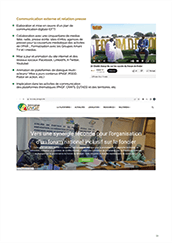
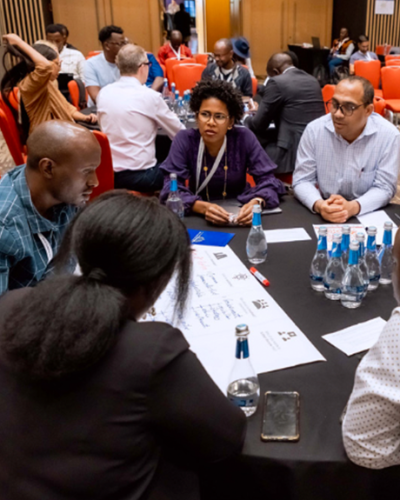
Assessment of
Achievements
Digital
communication
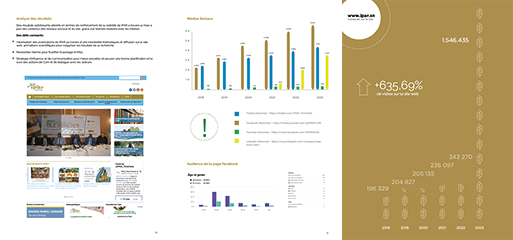
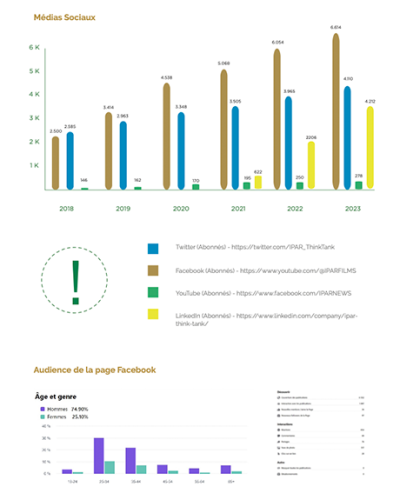
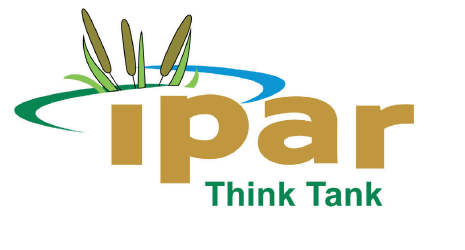
IPAR Think Tank extends its gratitude to all of its partners who contribute every day to the success of numerous projects.
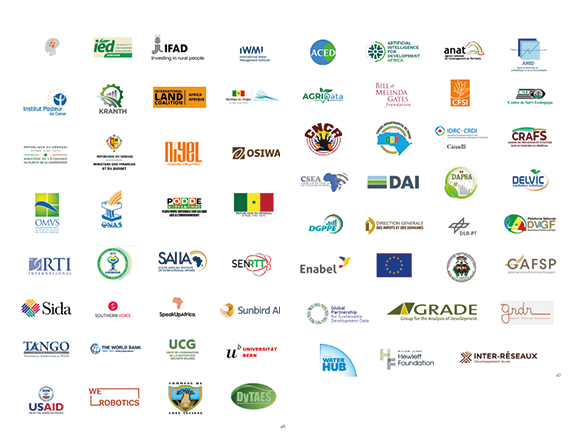
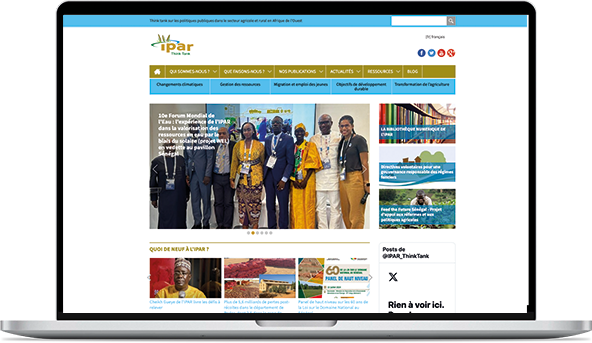
Discover all the news from our think tank on

Immeuble Kër Jacques Faye, Lot 445, Ngor
Dakar 16788 – Sénégal
Phone : +221 33 869 00 79
